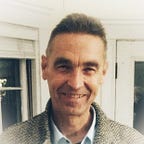Johan Galtung: Peace with Peaceful Means
On Saturday, February 17th, the Norwegian father of peace research as a science, Professor Johan Galtung, passed away in Oslo at the age of 93.
After studying mathematics and sociology, Johan founded the Peace Research Institute Oslo (PRIO) in 1959, the first institute of its kind for peace research. In 1964, he established the Journal of Peace Research as an academic platform for the field. In 1987, the Right Livelihood Foundation awarded Johan the “Alternative Nobel Prize” — the “Right Livelihood Award,” honoring not only his scientific work but also his mediation in crises and conflicts.
Johan wrote more than 1,500 articles and over 150 books, receiving a total of thirteen honorary doctorates or professorships.
I met Johan in 1983 at the Free University of Berlin. Attending his lectures in Berlin was a life-changing event for me. Engaging with his theories elevated my thinking to a new orbit. His concept of science as the seeking and breaking of invariances has deeply influenced my self-understanding as an action researcher; scientific activity as a force for good (as we might put it today). Later, after moving from Berlin to Witten/Herdecke University in West Germany, I invited Johan as a speaker to a student-led conference. He subsequently received a visiting professorship at that university, coming to us twice a year for a week or two. While lecturing across departments, he lived in our student commune (a house we had rented as a community). The discussions were non-stop, taking place late in the evening and early in the morning. One of these discussions led to the development of a crazy idea: a Peace Studies Around the World program that would take 35 students from 12 countries on a nine-month journey to study peace and conflict from a cultural perspective and to understand culture through the lens of the various world religions. We organized it as a student initiative, drawing on Johan’s global network and partnerships. He was the academic director and the academic credits were issued by Bard College.
In 1980, Johan predicted the fall of the Berlin Wall within 10 years. He also predicted the subsequent collapse of the Soviet empire and the rise of what now is known as Trumpism in the US. When the Berlin Wall fell, we were in the midst of our Peace Studies Around the World Program, examining these historical fault lines not just from the perspectives of West and East, but also North and South. Each world region was explored from the viewpoint of its center and respective periphery. This experience also had a profound impact on our lives.
Johan once shared with me the moment his life changed: as a child, he witnessed the German occupying forces arriving in Oslo and taking his father into custody.
Mahatma Gandhi’s ideas of non-violent resistance greatly inspired Johan. Gandhi’s “Political Ethics” was Johan Galtung’s first academic book, co-authored with his mentor Professor Arne Naess in 1955.
Johan established peace research as an academic field. Today, there are more than 500 academic programs at universities worldwide; when he started, there were none. “You will never reach peace through security” as he put it succinctly, “but you will reach security through peace.”
Johan introduced the concept of structural violence and the distinction between negative peace (absence of war) and positive peace (collaboratively shaping the future). In a time of exploding conflicts and continued blind spots to the deeper causes of violence, which leads to reactive responses by massively expanding the military-industrial complex worldwide, Johan’s approach to conflict resolution, which focuses on deepening our understanding of the root issues from direct violence to structural violence, and from there to cultural violence (legitimizing the other two), is more needed now than ever before.
Johan — You will be missed. Your courage to speak plainly, to tread new paths, and to constantly contribute to practical solutions has inspired many of us on our life and work journeys. We thank you — and I thank you from the bottom of my heart. It has perhaps never been more critical than now, as you are moving on, to sustain this courage that you embodied, here on earth, to presence, and to manifest that profound spark and flame that we can connect to as humans — a flame that in my case was ignited when I first heard you back in 1983 in Berlin.
